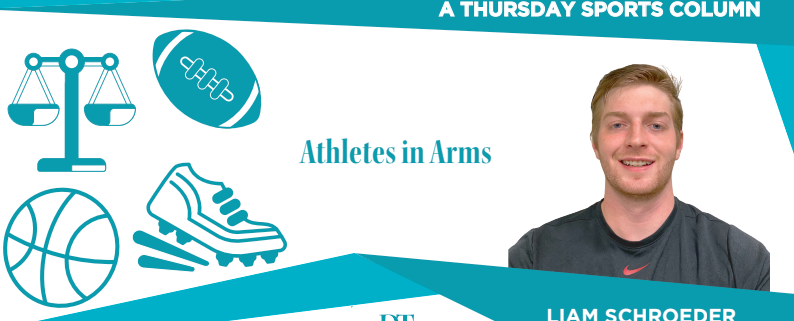Athletes in Arms: Growth doesn’t just happen in the weight room
Metabolic circuits can drain the life out of you, but no amount of physical work will keep you void of energy and motivation like depression.
College and professional sports analysts rave on about how a sore hamstring or a shoulder injury might affect an athlete’s performance during a game. But mental health is often overlooked as something that can tangibly affect the performance of athletes.
Throughout my time playing sports, physical injuries have been manageable, by having a tolerance for pain and receiving care from athletic trainers. Now at the collegiate level and on, physical recovery and preventative athletic medicine consistently keep my body at the optimal level of health
Even with the abundance of fueling that USC offers to student-athletes like myself, somedays I just cannot find it in myself to perform.
Being an athlete comes with a competitive mindset. I love competing in sports and casual games. However, with so much time off from volleyball now, I have been able to give my mind a break and take a step back. Because of this retreat, I have realized how unhealthy it is to constantly compare yourself to others and only equate your worth to sports.
This idea of excessive self-evaluation was especially evident during our last season when we didn’t have a consistent starting lineup. Our lineup and positional standings were always changing, which led to some team members consistently analyzing how we stacked up against each other. In a way, this can be good because it incentivizes individuals to push themselves to make the team better as a whole. However, players are much more than just the sport they play, and these competitive thoughts linger on the mind.
According to research from Drexel and Kean universities, about 25% of collegiate athletes reported “clinically relevant” symptoms of depression. Considering college athletes demand perfection from their bodies for multiple hours a day on top of the expectation of perfection in their studies at rigorous universities, there remains little time for the mind to rest.
“The rest” for me has been of particular focus recently. “The rest” refers to the time spent for both the body and mind to recover but also the time needed for a student-athlete to be an individual. Both of these are equally important and deserve their own respective time within a student-athlete’s schedule.
What the athlete needs most is time for personal interests and growth. An athlete should not be defined by their sport just as a worker should not be defined by their job. Both are individuals who desire personal fulfillment both within and outside their sport or career.
This is where I have been mentally the past few weeks. These past few months without constant practices have been the longest I have gone without an organized schedule of training in nearly a decade, which is honestly very hard to believe.
In many ways, I am so grateful for this break from training. I am sad that it had to happen under these circumstances, but it has given me the opportunity to grow as a person like never before. The growth process was not always perfect by any means, but I am beyond grateful for this time to focus on personal interests. Whether it be art, film or music, I’ve had so much more time to explore topics that I’ve been longing to invest time into with the time that is deserved to kindle a passion.
Throughout this time off, I have come to see that sports were often the perfect mask for depression as I didn’t have the time or energy to realize what I was feeling. I thought I was having my ass kicked by sports and school when it was really being kicked by mental illness. This also came in hand with a hyper-masculine athletic environment where vulnerability is viewed as a weakness and a failure.
My first two years at USC were filled with amazing memories and loads of success, but that success was only on the court and in the classroom, which left me wondering if that was it. Now with my own time to pursue other passions, I see how imperative it is to maintain good mental health and how easily a person can lose sight of it when your world is consumed by sports and school.
I do not know when sports will return to the state they were in eight months ago, but I hope that every athlete realizes how important it is to make time for themselves in a tightly regimented schedule. At the end of the day, looking after your mental health will not only provide for growth as an individual, but also growth in your game.
Liam Schroeder is a junior writing about sports, social justice and student-athletes. He is also a middle blocker on the USC men’s volleyball team. His column, “Athletes in Arms,” runs every Thursday.

